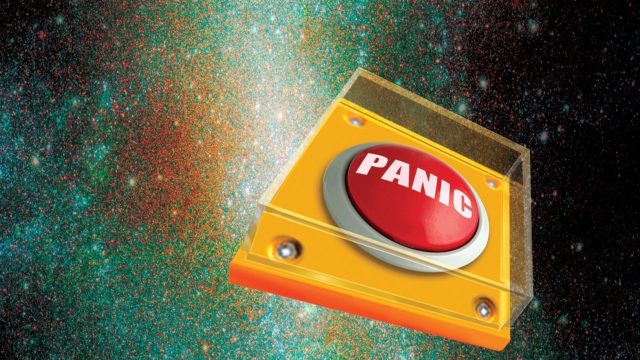What we call the internet — a word that at root describes connection more than location — is more accurately defined as the World Wide Web, that place where we can look up information on pretty much anything on and around the planet. Where to go, what to do when we’re there, how other people live, why they’re saying that shit about us. The World Wide Web was invented in 1989 by Tim Berners-Lee and Robert Cailliau. The latter created a logo for this new network/place/world — three large Ws and the motto “Let’s Share What We Know.”
Of course, the internet was invented earlier than that. In 1978, to be exact, when Douglas Adams came up with The Hitchhiker’s Guide To The Galaxy, an interstellar “publication” accessed through a handheld computer that contained information on pretty much everything in and around the multiverse — where to go, what to do when you’re there, how other people drink, why they’re not covering our bar tabs. A decade before it existed for real, the internet was there in the pages of Adams’ work.
And in 1992, Adams killed it, along with everyone on the planet Earth.
***
Adams had destroyed the Earth before. It’s the ironic inciting incident of The Hitchhiker’s Guide to the Galaxy, in which, shortly after series lead Arthur Dent finds out his home is set to be bulldozed by an uncaring bureaucracy in order to build a highway, the rest of the world learns their planet is about to be nuked by an uncaring bureaucracy in order to build a, uh, space highway. Arthur is rescued at the moment of explosion by his friend Ford Prefect, an alien who has been stuck on Earth and writing about it for the Guide, and after a run-in with the horrible Vogons — the procedure-obsessed slugs in charge of the demolition — he goes on a wild and frequently very funny series of adventures throughout the galaxy, extending through three subsequent novels.
If Adams is not particularly somber about his planetary genocide, he’s not cavalier about it either. (And similar things happen to other worlds throughout the series. No one is safe.) He can just see the humor in being totally boned like this, and how that acknowledgment of obliteration is in some ways a survival tool. Particularly if you are a young person just beginning to grope with the cruelty of the universe — in a wonderfully perceptive piece on Hitchhiker’s Guide, beloved Soluter Drunk Napoleon describes encountering the book as a teen and immediately grokking what it’s up to: “Adams has a vision of the world as a place which works on a set of rules that you will never fully grasp or understand, and what you do understand operates under an absurd, internally consistent logic of its own. You will be humiliated at every turn by people who seem to know a lot more than you and are certainly much more powerful, and you can trust neither the people around you nor your own common sense. I find this very funny and very easy to relate to.”
And it’s also easy to relate to the anger and frustration underneath this recognition of absurdity. The first four books in the series begin with a (slightly altered each time) introduction of How We Got Here, which makes some pointed and clever observations before dropping in the line, “One Thursday, nearly two thousand years after one man had been nailed to a tree for saying how great it would be to be nice to people for a change,” and the violence there in proportion to the plea always takes me aback. Adams is furious about how hard we have made it for ourselves, without the universe needing to add more pain. In some ways, the Guide we read excerpts from throughout the series is a pushback to all of this. Its entries are explanatory, if often not particularly helpful, and knowing without being dickish. It is a companion, and even when it is turned off it has something helpful to say: large letters on its case reading DON’T PANIC.
***
In fourth novel So Long And Thanks For All The Fish, which came out in 1984 and concluded the series for many years, Arthur returns to a miraculously restored Earth. It is a parallel world mostly replicating our own, brought into existence through the help of friendly dolphins (this summary is not much briefer than what Adams lays out in the text), and Arthur largely resumes his life there while also falling in love with a woman who, like him, knows something extraordinary has happened. Their courtship is very sweet, and at the end they go back into space to see the location of God’s Final Message To His Creation, which is something wry and resigned and very much in tune with what Adams has written before, if a little more downbeat. But they’ve found out what the deal is, they’re together and the adventures seem over. What a relief.
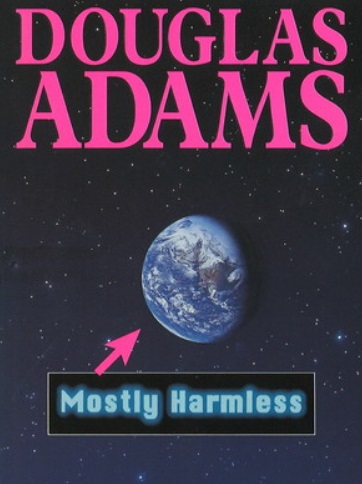
Mostly Harmless, released in 1992, does not open with any of the characters we’ve come to know — not quite. It introduces Tricia McMillan, a former astronomer-turned-TV anchor who is defined by a choice she made decades ago to not run away with what turned out to be an alien visiting earth. She is this parallel world’s version of Trillian, a woman who was introduced in the first novel and who did decide to go out into the universe, having many run-ins with Arthur and Ford over the course of the series. Tricia’s regret over what she missed has made her noticeably sad — she has found mild success in her work but no happiness, no purpose, and when she uses a major interview to rip apart an astrologer for believing in this horoscope crap, the astrologer reaches out with care and concern to find out why Tricia is so upset. Astrology is “fake,” the astrologer says, but it’s a way to think about problems, rules to define a structure — a way to understand the world, and Tricia only understands that she feels like she’s lost something. But she gets a second chance at the extraterrestrial a day later, when yet more aliens land in her backyard. These Grebulons are camped on the far side of Pluto and all have amnesia (how all this happened is laid out in a classic bit of Adams’ absurd logic) and they, too, have no purpose and have come to the multi-talented Tricia for help. They want her to rework Zodiac charts for people in their planetary position. They want someone to tell them what to do.
This is the first 20% of the book and it sets the tone. The whimsy Adams has deployed in the past is here, but it is mixed with regret and occasionally curdles outright — Adams disdains New York City with a meaner, more dismissive take than his insulting of LA in Fish. The universe is absurd and cruel but the cruelest thing for Tricia is how it gave her a choice and she biffed it. Later on, her counterpart Trillian returns, and we find out that her galaxy-hopping adventures have made her weary and lonely and that she wishes she’d stayed back on Earth, the grass being greener on the planet that actually has grass. The universe is enormous, but contrary to all those nerds and their Big Bang theories it shrinks by the day on a personal level as the choices you make shut down other possibilities.
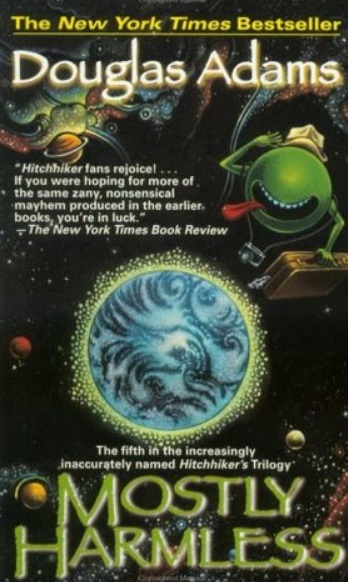
And they create ones you were not prepared for. Poor Arthur, who in the last book had a bunch of mind-blowing sex in mid-air with his true love, is now alone after she was wiped from existence in a hyperspace jump. He spends years trying to find her, moving from miserable parallel Earth to miserable parallel Earth before crashing on a backwards planet and becoming a guru of sandwich-making. One of Adams’ greatest strengths is his refusal to place humans on an elevated plane in his fiction. He’s not turning up his nose at what we can do, he just has a better sense of our true accomplishments and knows (like Warren Zevon) that a good sandwich is nothing to sneeze at. Arthur might not have the happiness that he had, but he finds contentment for a time. (He also knows, because of some weird time manipulation in the third book that is brought up suspiciously often now, that he himself can’t die until he visits a certain place and accidentally causes someone else to get killed — he knows the name of the place and nothing else except that he hasn’t gotten there yet.)
But this, of course, is destroyed. To fund his travels, Arthur sold off numerous bits of DNA over the years and in the middle of making a sandwich he is visited by Trillian, who informs him that he now has custody of their daughter Random. Trillian got Arthur’s DNA from the sperm/various fluids bank and conceived Random to deal with her own loneliness, but the difficulties of caring for her while also being a war correspondent for an intergalactic broadcast service — coupled with weird time fluctuations that have brought Random to surly teenhood in a few short years — lead her to dump the poor girl on her father.
Random is angry, clumsy, hurtful, regretful, too perceptive about others for her own good (and theirs) but can’t perceive herself and her place, or lack thereof, in the universe. In short, she is a teenager. What Adams is doing here for the first time in the series is bringing the kind of young person who desperately needs a Hitchhiker’s Guide to the Galaxy — a huge part of his audience — into this world, and then giving her none of the comfort here that his books provided to those reading them. Random doesn’t have cool alien friends and wild adventures, she has a mom abandoning her and a dad who is well-meaning but utterly unequipped to care for someone that he, however inadvertently, is responsible for creating. Like all teens, she needs a guide, and here she should get the Guide, but instead she gets something else.
***
Tricia, Trillian, Arthur, Random, the Grebulons, are all flailing, trying to find a way to exist in a hostile and confusing universe. Ford Prefect usually just gets drunk when confronted with insurmountable problems, but in Mostly Harmless he finds something to fight for — the Guide itself. Upon returning to the Guide offices, Ford discovers the Guide has been bought out by the hideously named InfiniDim Enterprises and is no longer a place of “tax scams and rackets and graft and shady deals” where secretaries ruthlessly edit pieces the editors are too drunk to deal with. It’s now something much worse, a place of “neat grey office cubicles and executive workstation pods…dreary with the hum of memos and minutes of meetings flitting through its electronic networks.” So different from the ramshackle and fun Guide founded by Ford and a bunch of other wastrels, but not that different from the corporate bullshit familiar to many people on Earth. But it’s not just a new management, but a new way of doing things, Ford’s boss tells him:
“What we do is sell one Guide billions and billions of times. We exploit the multidimensional nature of the Universe to cut down on manufacturing costs. And we don’t sell to penniless hitchhikers. What a stupid notion that was! Find the one section of the market that, more or less by definition, doesn’t have any money, and try to sell to it. No. We sell to the affluent business traveler and his vacationing wife in a billion billion different futures. This is the most radical, dynamic and thrusting business venture in the entire multidimensional infinity of space-time-probabilty ever.”

This has a colder, grimmer feel. Taking away the potential appeal to many in order to appeal to the few, collapsing variety into singularity and introducing optimization; what is being optimized is of course not what you want, but you are not in charge. Swearing vengeance and retribution, Ford beats up the editor and goes on a rampage through the building, hacks its computers,goes on a second rampage, and escapes by the skin of his teeth after discovering that the building is full of Vogons, before finding this new Guide. It is jet black and only has one word on its cover: PANIC.
Ford steals it and mails it to himself, courtesy of — who else — his old buddy Arthur Dent. But when it arrives at a particularly fraught point for Arthur and Random, she steals it a second time and is the first person we see interact with the Guide Mark II, which interacts back. It takes the form of a featureless bird and can access all probabilities in the multiverse. “For me, anything is possible,” the Guide Mark II tells Random. “I am omniscient and omnipotent, extremely vain and, what is more, I come in a handy self-carrying package.” At this point, it is hard not to wonder whether Adams himself had some kind of connections out of time and space in order to so accurately describe a portable, powerful, obnoxious bird app.
A bird app that tempts its users. The Guide Mark II tells Random it can take her to Earth, the planet of her parents’ origin, where a woman who looks just like her mother is hanging out. Random, desperate to find a place where she fits and a person who wants her, is more than happy to go and winds up hijacking the spaceship of none other than Ford Prefect, who has finally come to pick up his package. And he’s the one who finally realizes what’s going on here — reverse temporal engineering. The Guide Mark II manipulating its users to think they’re making decisions, which leads it to organize events and happenstance in order to reach certain outcomes. The Guide Mark II is not unstuck in time, it is stuck in every time and can make small changes with huge consequences. Like getting Random to land on Earth (followed shortly by Ford and Arthur, and Trillian herself) and attack a confused Tricia McMillan, just returned from reworking horoscopes for the Grebulons. Whose latest chart shows some bad news for the leader, a Taurus — Earth is rising into Capricorn. This might require some kind of action.
***
When he meets Ford again, Arthur is not having a good day. His daughter, who he didn’t know about in the first place, has rejected him and run away to another planet, and he lets Ford know he’s at the end of his rope. “We assume that every time we do anything we know what the consequences will be, i.e., more or less what we intend them to be. This is not only not always correct. It is wildly, crazily, stupidly cross-eyed-blithering-insectly wrong!”
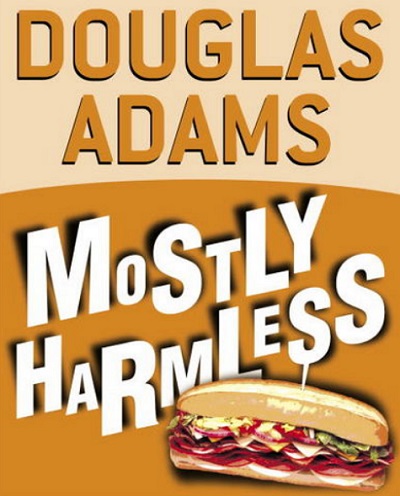
It’s one thing to know this, another thing to truly understand it. The absurdity of the Earth being blown up in the first novel is the opposite of consequence, or more accurately the concept of consequence magnified past all meaning — things happened to make this the way it is but you could never have done anything about them. This is hard enough to deal with, but what Arthur is talking about here is the real idea of fucked consequence, that you can do things with the best intentions and have them turn out so wrong, tangential or perpendicular or on an entirely different axis to what we thought would happen. But it still comes back to you, and the other shoe, the one on the foot of an implacably hostile universe, is waiting to stomp down as well. The Vogons had the job of destroying Earth and they’ve never stopped, ultimately taking over the Guide itself to remove — no, harness — its randomness, its ability to touch so many worlds, and use it to bring all of these bothersome Earthlings back home at the right moment, where a confused group of aliens looking for an answer is ready to follow the stars and blow up a planet.
Arthur and Ford, Tricia and Trillian, and Random all converge at a bar in London. Random is waving a gun around, more distraught than ever now that she’s met yet another non-mother. And she fires it, and Arthur ducks, and the shot kills another man, and all of a sudden Arthur realizes he is in the one place he should not be. And he comes to one final understanding:
“It was suddenly very clear to him that there was nothing to be done, not now or ever. Through the new strangeness of noise and light he could just make out the shape of Ford Prefect sitting back and laughing wildly.
A tremendous feeling of peace came over him. He knew that at last, for once and forever, it was now all, finally, over.”
You can make a mistake that dooms you. Ford becomes an action hero and fights the plot against the Guide, and his fighting brings the plot to its fruition. Trillian creates Random for her own fulfillment and abandons her, Arthur provides the other half of Random’s creation but can’t create a meaningful relationship with her, and they set her on a course of destruction. Random herself is constantly breaking things and making mistakes with a teenager’s lack of patience and foresight. Unable to see that things could be better, she constantly makes them worse. And in her self-doubt and hope for a second chance, Tricia creates a way of looking at the world that destroys the world. Mostly Harmless takes its title from a joke way back in the first book of the series, that Ford’s Guide entry for Earth was edited down into the single word “Harmless” before being expanded to “Mostly Harmless.” Like a lot of Adams’ jokes, this has teeth that aren’t immediately visible. Because “mostly harmless” means there is still some harm, and here that harm winds up blowing back on the Earthlings themselves. The Grebulons pull the trigger to remove an unlucky planet crossing their star chart. The Earth and all its possible futures are destroyed and the Guide itself winks out of existence. The end.
***
In a 1998 interview with The AV Club, Adams talks a lot about his new projects, including the finally-happening Hitchhiker’s Guide to the Galaxy movie (which would eventually come out in 2007, with different players than Adams discusses here). And he briefly touches on the possibility of another book in the series, despite Mostly Harmless’ bleak ending apparently shutting that door, and why the book developed that tone to begin with:
“People have tried to read all sorts of complicated reasons into it, and the reason was that I just had a lousy year. Just for all sorts of personal reasons, from a terrible death in the family to… Every kind of area, whether it was personal or professional, had just gone sour on me, against a background in which I had to write a funny book, which turned out not to be very funny.”
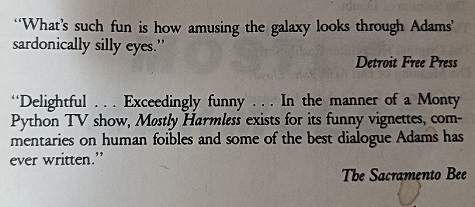
“The later three books [are] more of somebody who has figured out the world and finds that it indeed doesn’t make much sense. They’re more surreal and cynical but they don’t have that buoyancy of somebody trying to come to terms with the world they’ve recently began to uncover.” Fearless Leader Julius Kassendorf noted in that Hitchhiker’s Guide discussion that what is really disturbing is how Mostly Harmless’ knotty plot seems to track with Adams’ own disillusionment. The Vogons, via the reverse temporal engineering of the Guide, create a complex web of interactions that can and must and is desired to lead to the destruction of all of these characters readers love, which is what Adams as the author is doing as well. And making the Guide the method of their destruction is particularly cruel.
“Let’s Share What We Know,” the World Wide Web says, and what we know is ridiculous and inaccurate and wild and maybe even harmful. The Guide is not that last one but it does include lots of nonsense and that is what makes it fun. It is constantly changing and its shared knowledge is created by and feeds the idea of a “we” bigger than one person. The Guide Mark II is one thing for one person and it is predicative, not accumulative. “You decide what you want. I then merely make sure that it has already happened,” it tells Random, a compendium of sources now acting as algorithmic dictator. The old Guide went off on tangents you didn’t know you were interested in; the new Guide pretends to care for your needs while leading you where it wants to go. Sound familiar?
The Guide Mark II is about the destination, not the search; the answer, not the question. “If you received an answer, the question might be taken away,” the village wise man in Arthur’s new home says (this is agreed to be the only actually wise thing he’s ever said and likely a complete accident). And there’s ultimately only one answer for each person, the most known answer there is. Nothing left to share. Turning something designed to point the opposite way in that direction, toward a closed loop, toward death, speaks to a despair that verges on nihilism.
At the end of a long profile of Metallica for The New Yorker, Amanda Petrusich asks singer/guitarist James Hetfield about the band’s infamous album St. Anger, which sounds like absolute dogshit (the drums in particular have the tone of toddler banging on pots and pans) and was created while the band was tearing itself apart and going through contentious therapy to come back together. “In the end, Metallica made a record with all the defeated energy of a sinking stone,” Petrusich writes. “St. Anger is airless and lacks magic. (It also lacks guitar solos.) ‘Eh, it’s honest,’ Hetfield told me, shrugging. ‘You might not identify with it, or you don’t like the sound. But that’s where we were, and that’s what we put out. It’ll have its time, maybe.’ He laughed. ‘Maybe not!’” It’s a long album of rage and pain, but it finally comes to a close with “All Within My Hands,” which ends with Hetfield screaming over and over, “Kill kill kill kill kill!”
***
St. Anger is not a fun or even a good listen but Hetfield is right, it is honest. Adams’ bad year became a bleak book. That too is honest. But later on, he wanted to create another ending to the series, on an “upbeat note.” The radio adaptation of Mostly Harmless has Arthur and friends saved at the last minute and gives them a happy ending; the way this happens is fairly clever and it makes sense. And Another Thing, the final book in the series, comes up with a different way to bail the gang out, and it too is a smart solution.
At least, the summaries of these endings sound like they work to me. I haven’t actually read them, because Adams didn’t write them. He died in 2001, with notes for a sixth book but no real draft — Eoin Colfer wrote what would become And Another Thing in 2009 and BBC vet Dirk Maggs wrote the 2005 radio adaptation. I thumbed through And Another Thing once and quickly put it down. The voice felt all wrong: Colfer was trying (with the full support of Adams’ family) but failing to capture something unique. If Adams had actually written a sixth book, I would have read it, and I think it would have been good, but I don’t think it would negate or counter Mostly Harmless and Adams’ voice saying things that are hard and sad but somehow comforting in their despair.
David Foster Wallace famously tore apart John Updike’s Toward the End of Time as an encapsulation of Updike’s narcissism ultimately taking over his prose and his ego encompassing everything. The novel involves an old guy trying to get laid in a poorly-thought-out post-apocalyptic Massachusetts. A botched prostate exam is one signifier of the end, but Wallace notes the main character is “is interested in cosmic apocalypse only because it serves as a grand metaphor for his own personal death.” If I end, the world does too! Despite both science and art disproving this, it is way too easy to get caught up in Updike’s way of thinking here. After turning 40 this year, I can’t help noting Adams was the same age when he published Mostly Harmless. The year of the mid-life crisis, realizing you’re on the downhill side (and of course Adams didn’t even get another decade). Mapping your own decay onto the world at large, or maybe the decay of a virtual one, and embracing doom and gloom and the sense that both you and your world have fucked up beyond repair.
But things do suck sometimes. Maybe even a lot of the time. And it’s OK to not come to terms with that, to put your sadness and anger down in a book or on an album without offering any relief. I think that’s different than Updike’s self-indulgence. It’s definitely angrier. E.M. Forster said “only connect”; Adams wrote the internet into existence and then pulled the plug. But he put that end out there as well. Let’s share what we know. Sharing a bitter drink is still sharing, it might be what another person needs to shake up their head and get some perspective. You might have fucked up, you might not have an answer, but neither do other people. You don’t have to panic.

